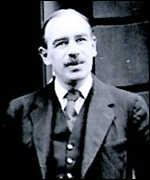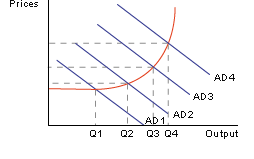John Maynard Keynes
From dKosopedia
Category: United Kingdom people
John Maynard Keynes (1883-1946), a British economist whose ideas spawned the rise of Keynesian economics (usually referred to as the Keynesian Revolution), is perhaps best known for his book, The General Theory of Employment, Interest & Money (1936), which served as the philosophical foundation for much of 20th-Century economic policy and thought. Keynes's primary argument -- that a free-market economy would not necessarily lead to full employment (the maximum level of employment at which prices remain stable) -- took on enormous influence during the Great Depression, when Unemployment rates in the United States reached nearly 25%.


(Source: BBC News and The Virtual Economy)
Classicalism vs. Keynesianism
Traditional economics, or Classical economics, held that involuntary unemployment was impossible. "The market always clears," they argued. The Keynesian couterargument to this came in the form of price- and wage-stickiness. If, for example, unionized labor, which had been much more prevalent in Keynes's day, refused to take the nominal pay cut necessary to ensure full employment, the result would be involuntary job-loss. Members of the Austrian School of economics criticized Keynesian policy as being the foundation for ever-increasing government intervention in the economy, and ever-wider fluctuations in economic activity. This does not, however, seem to be supported by the facts (see chart below), as recessions have become shorter, and expansions, longer, since the end of WWII. On the argument, that the market would, in the long run, work out the problems that caused economic downturns originally, Keynes wrote,
But this long run is a misleading guide to current affairs. In the long run we are all dead.
Savings & The Great Depression
Perhaps the most pressing problem of the Great Depression, from a Keynesian perspective, was the issue of holding too much money -- not in banks, but in (say) coffee cans under beds, as many of the Greatest Generation were known for, due to their lack of trust in the banking system. As the Roaring Twenties came to an end with the stock market crash of 1929, many banks went under, leaving customers fearful of losing their savings. (This is prior to the establishment of the FDIC.) Many account-holders attempted to empty their savings, instead keeping money in their hands and not spending on anything but necessities. This led to a contraction in the money supply, not because of the Fed's actions, as Monetarists would later contend, but because of its inaction.
Overthrowing the Establishment
The policy implications of Keynes's ideas remain strong in today's economy, governing, in large part, the policies of the Federal Reserve Board, whereby interest rates are cut, as the economy slides into recession, stimulating investment and demand. (In the other direction, as the economy moves into rapid expansion, with inflationary pressures, interest rates are increased.) During the Great Depression, Keynes advocated worker programs, financed with deficit spending, designed to stimulate consumption and place the economy back on the road to recovery. He was notoriously optimistic about the future, but believed, during the days of the depression, that capitalism and liberty were in grave danger, faced with their ideological enemies in fascism and communism.
Many economists argue that World War II allowed his theory to be successfully implemented. Thus, Keynes was crowned, in the more-liberal academic circles, "The Man Who Saved Capitalism".
Versailles
Keynes's other famous books include The Economic Consequences of the Peace, dealing with the politics surrounding post-WWI Europe and the Treaty of Versailles, and A Tract on Monetary Reform, which served as a great influence to famous economists like Milton Friedman, the founder of the Monetarist movement (or Chicago School) of economic thought. In The Economic Consequences..., Keynes wrote of witnessing what he believed to be the complete annihilation of an already-devastated German economy by France, with US President Woodrow Wilson and British Prime Minister David Lloyd George silent and, therefore, no less guilty. The financial claims against Germany were nearly double the amount Keynes estimated the country would be able to pay. Many politicians, answering to the anger of the public, attempted to justify this as punishment for Germany's destruction of billions of dollars in property during the war. Answering them, Keynes wrote,
Some preach it in the name of Justice. In the great events of man's history, in the unwinding of the complex fates of nations Justice is not so simple. And if it were, nations are not authorised, by religion or by natural morals, to visit on the children of their enemies the misdoings of parents or of rulers.
The book would go on to become a best-seller in Britain and is seen, in some ways, as having predicted the rise of Adolf Hitler and World War II.
Final Years
During the Second World War, Keynes worked as an advisor in the British Treasury and, after the war, as one of the chief architects of the International Monetary Fund, or IMF, though his particular ideas would not serve as its foundation. He died, in 1946, after suffering the last in a series of heart attacks.
Well known Keynesian economists include Paul Krugman, N. Gregory Mankiw, J. Bradford DeLong, Robert Solow, James Tobin, Paul Samuelson, and David Romer.
Economic Fluctuations in the United States, 1795-1992:
![[Main Page]](../../../../upload/banner-blue-135.jpg)